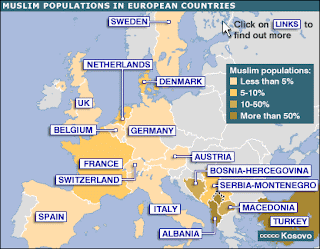What are now often called ‘Western values’ – democracy, equality, toleration, freedom of speech, etc – are the products largely of the Enlightenment and of the post-Enlightenment world. Such values are, of course, not ‘Western’ in any essential sense but are universal; they are ‘Western’ only through an accident of geography and history.Kenan Malik in Pandaemonium. Here
Christian Western Europe rediscovered the Greek heritage, and in particular Aristotle, in the thirteenth century, a rediscovery that helped transform European intellectual culture. It inspired the work of Thomas Aquinas, perhaps the greatest of all Christian theologians, and allowed reason to take centre stage again in European philosophy.
But how did theologians and scholars in Western Europe find their way back to Greek thought? Primarily through the Muslim Empire. As Christian Europe endured its ‘Dark Ages’, an intellectual tradition flowered in the Islamic world as lustrous as that of Ancient Athens before or Renaissance Florence after. Centred first in Baghdad and then in Cordoba, in Muslim Iberia, Arab philosophy and science played a critical role not just in preserving the gains of the Greeks but in genuinely expanding the boundaries of knowledge, both in philosophy and in science.
Arab scholars revolutionsed astronomy, invented algebra, helped develop the modern decimal number system, established the basis of optics, and set the ground rules of cryptography. But perhaps more important the science was the philosophy. The Rationalist tradition in Islamic thought, culminating in the work of Ibn Sina and Ibn Rushd, is these days barely remembered in the West. Yet its importance and influence, not least on the ‘Judeo-Christian’ tradition, is difficult to overstate. Ibn Rushd especially, the greatest Muslim interpreter of Aristotle, came to wield far more influence within Judaism and Christianity than within Islam, his commentaries shaping the thinking of a galaxy of thinkers from Maimonides to Aquinas himself.
Christians of the time recognized the importance of Muslim philosophers. In The Divine Comedy, Dante places Ibn Rushd with the great pagan philosophers whose spirits dwell not in Hell but in Limbo ‘the place that favor owes to fame’. One of Raphael’s most famous paintings, The School of Athens, is a fresco on the walls of the Apostolic Palace in the Vatican, depicting the world’s great philosophers. Among the pantheon of celebrated Greek philosophers including Aristotle, Plato, Socrates, Pythagoras and Diogenes stands Ibn Rushd.
Today, however, that debt has been almost entirely forgotten. There is a tendency to think of Islam as walled-in, insular, hostile to reason and freethinking. But the fact remains that the scholarship of the golden age of Islamic thinking helped lay the foundations for the European Renaissance and the Scientific Revolution. Without the Muslim world, it is possible that neither may have happened.
Read "Islam is the answer for the environmental crisis", says Prince Charles

No comments:
Post a Comment